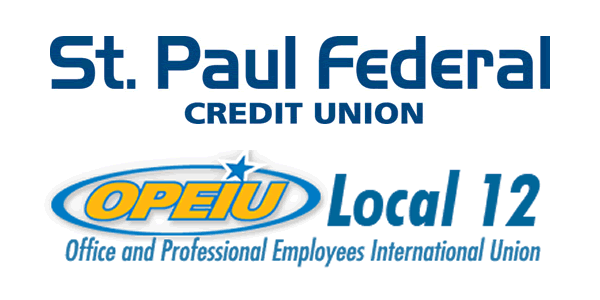

Share
Perhaps it’s a sign of the times, but it’s newsworthy when an employer and a union reach a contract settlement that addresses each party’s needs with a minimum of wrangling.
That’s what happened recently at St. Paul Federal Credit Union, where some 20 tellers, customer service agents and mortgage loan officers are represented by Office & Professional Employees International Union Local 12. Their new, three-year pact raises standards for workers in the financial services industry, said OPEIU Local 12 Representative Lance Lindeman.
“They have better wages and benefits than the big banks like Wells Fargo,” he notes.
The improvements began last year – even before the previous contract expired – when management approached the union about instituting a $15 minimum wage for all positions.
CEO Tom Glatt said the previous starting wage was $12 an hour, but the credit union wanted to attract and retain quality workers.
Glatt said he “sat down with the numbers” and realized the cost of replacing and training an employee exceeded the expense of raising the wage. He said the executive team also wanted to do the right thing.
“To support a family of three people – one child, two adults – in Ramsey County or Washington County, where most of our employees live, costs $60,000 a year,” he said. “How in the world, making $25,000 a year, are you going to pay for a family?”
A full-time worker earning $15 an hour earns $31,200 a year.
“I think that is awesome they took the initiative to raise the minimum wage,” said Talia Jones, a nine-year employee at the credit union who currently is a mortgage service specialist. “It is hard to raise a family on the current state and federal employee minimum wage.”
In addition, the credit union offers 100 percent employer-paid medical, dental and vision care – a benefit that is increasingly rare in today’s workplaces.
St. Paul Federal Credit Union and members of OPEIU Local 12 went into contract negotiations on a new contract to take effect March 1. Talks went smoothly and lasted about five hours.
“We all took into consideration what each department does,” said Jones, who participated on the Local 12 bargaining team. “We tried to get the most for the greater good.”
Ash Khatib, a senior loan officer who was participating in his first contract negotiations, said, “It was very smooth and it went fairly quickly … I think everyone was happy with the deal that we got.”
Glatt said, “Both sides had the same objective – how do we keep good people.”
The new contract incorporates the $15 minimum wage, maintains the employer-paid health care and provides improvements to the retirement plan.
Lindeman, whose union represents 2,500 workers in more than 100 workplaces, found the atmosphere in the bargaining sessions “refreshing.”
St. Paul Federal Credit Union has its roots in the labor movement. It was founded in 1953 by members of Local 110 of the International Brotherhood of Electrical Workers. Today, six of the seven board members are electricians.
The credit union expanded beyond the IBEW in 2004, opening its doors to membership by the wider community.
Unlike a corporation, that must make profits for shareholders, the credit union’s “customers and our owners are exactly the same people,” Glatt said. Customers like to walk in the door and know the staff person who is helping them, he said.
“The credit union is doing very well. … If the company’s doing well, let’s share it,” he said.

